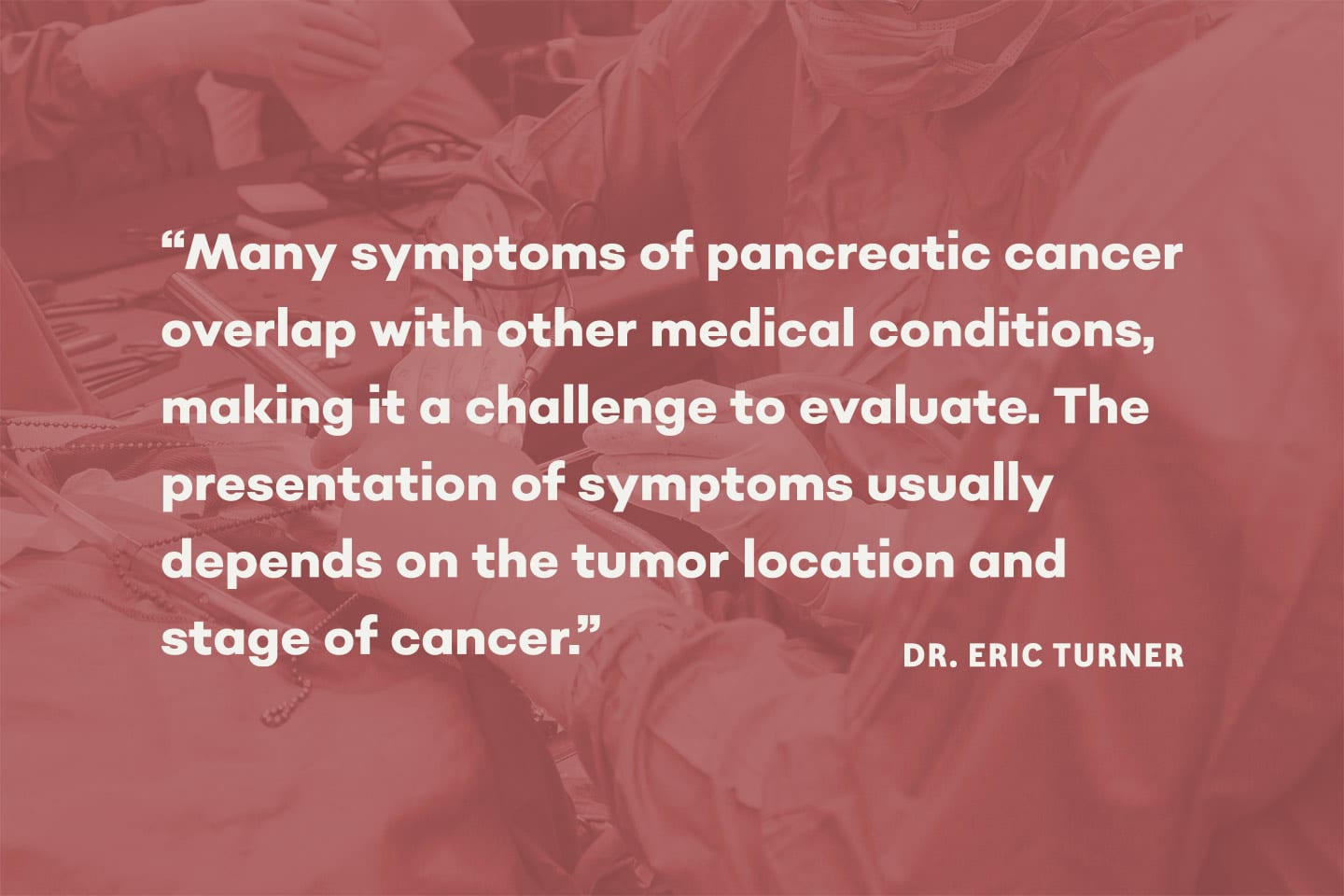What You Need to Know
Early detection of pancreatic cancer can be difficult. Here’s what you should know, and how to tell if you might be at higher risk.
By Anna Hill
The purpose of the pancreas in the human body is to aid in digestion and regulate blood sugar – two very important functions. As with all other parts of the body, the pancreas can be subject to cancer, and unfortunately, it can often be difficult to detect in its early stages. However, there are risk factors to be aware of, as well as ways to lower your risk of pancreatic cancer.
Pancreatic cancer is a disease where malignant cells form in the tissues of your pancreas. These cancer cells often begin to accumulate, which results in the formation of tumors. If left untreated, these accumulating cells can spread throughout the body, starting with nearby organs and blood vessels and eventually extending out to more distant parts of the body.



Oncologist,
Peeples Cancer Institute,
Hamilton Health Care System
Risk Factors
Though the exact cause of pancreatic cancer is not known at this time, research has shown that there are risk factors that might increase your likelihood of developing it. These include:
- Smoking, or having a history of smoking
- Being very overweight or obese
- Having a family history of diabetes, chronic pancreatitis, or pancreatic cancer
- Having certain hereditary conditions, such as MEN1 syndrome, Lynch syndrome, or hereditary breast and ovarian cancer syndrome
- Older age
Dr. George M. Philips, an interventional endoscopist with Erlanger Gastroenterology in the Erlanger Health System, proposes those with a high-risk family history be particularly vigilant. “I would advise that patients with a family history of pancreatic cancer should discuss it with their primary care physician, and if the family history is strong enough or indicative of a syndrome of cancers, then specialist care should be sought,” he says.
It is important to remember that having a risk factor doesn’t always mean you will get the disease, and not having risk factors doesn’t necessarily exclude you from getting it.





Hepatopancreatobiliary (HPB) Surgeon,
University Surgical Associates
Diagnosis
Pancreatic cancer can be difficult to diagnose in its early stages, as it often shows no signs or symptoms. Dr. Eric Turner, an oncologist with Peeples Cancer Institute in the Hamilton Health Care System, explains, “Many symptoms of pancreatic cancer overlap with other medical conditions, making it a challenge to evaluate. The presentation of symptoms usually depends on the tumor location and stage of cancer.” Signs and symptoms that often present include jaundice, light-colored stools, dark urine, weight loss for no known reason, loss of appetite, fatigue, or pain in the upper or middle abdomen and/or back.
If your doctor suspects you have pancreatic cancer, there are a number of tests you might undergo in order to reach a diagnosis. You might be sent to a hepatopancreatobiliary specialist, who focuses on diseases of the liver, pancreas, and biliary tree, for a consultation. Dr. Julie Koffron, a hepatopancreatobiliary (HPB) surgeon with University Surgical Associates and consultant for CHI Memorial, says, “Typically, when pancreatic cancer is a concern, the first diagnostic test is a CT scan of the abdomen, focusing on the pancreas and surrounding organs.” Additional tests might include imaging tests for your internal organs, such as an ultrasound, CT scan, PET scan, or MRI; an endoscopic ultrasound that takes images from inside your abdomen; a biopsy test, in which tissue is obtained from an endoscope or a needle and examined under a microscope; or blood work, in which your blood is taken and tested for specific proteins or tumor markers that would be shed by pancreatic cancer cells.
When testing is completed, if pancreatic cancer is found, your doctor will try to determine the extent of the cancer, which can present from stage 0, which means the cancer is confined to the pancreas, to stage IV, which means that the cancer has metastasized and spread to other parts of the body such as the liver, lungs, or abdominal cavity.
Treatment Options
Once diagnosed, there are a variety of ways your doctor might proceed in treating the cancer, including the following:
Surgery
The operations that might be used on patients with pancreatic cancer include surgery to remove the head of the pancreas, surgery to remove tumors in the pancreatic body or tail, surgery to remove the entire pancreas, or, in rare cases, surgery to remove or reconstruct nearby affected blood vessels.
Chemotherapy
This treatment uses drugs that can be injected or taken orally in order to eradicate cancer cells. In those with advanced or metastatic pancreatic cancer, chemotherapy might be used for controlling cancer growth, prolonging survival, or relieving a patient’s symptoms.
Radiation Therapy
This type of treatment uses high-energy beams to destroy cancer cells. Radiation therapy may come before or after surgery, or it may also be used in combination with chemotherapy.
Clinical Trials
There are often new clinical studies that are being developed to treat cancer, and agreeing to participate in a clinical trial, while not guaranteed to treat or cure your disease, might give you the chance to try the latest developments in treatment and provide access to methods that might otherwise not yet be available to you.
Palliative Care
Palliative care is designed to improve a patient’s quality of life by controlling or alleviating symptoms of their cancer. For pancreatic cancer, some palliative options might include radiation therapy to shrink tumors, nerve-blocking injections to relieve pain, or surgery to place stents or bypass blocked portions of bile ducts or the small intestine.



The next steps following treatment are dependent upon which type of treatment the patient has undergone. Dr. Turner explains, “If a patient has undergone surgery with cure as an intent, they are typically placed into observation with ongoing clinical exams, periodic surveillance imaging, and routine blood work over the course of several years.” If the patient’s disease is more advanced, they might undergo different regimens of chemotherapy or other treatments over time. “Patients with end-stage disease are often offered hospice to manage the symptoms of pancreatic cancer near end-of-life,” Dr. Turner adds.



Interventional Endoscopist,
Erlanger Gastroenterology, Erlanger Health System
Prevention
While there is no guaranteed method for preventing pancreatic cancer, there are steps you can take to lower your risk. Dr. Koffron advises that patients closely manage any other pancreatic diseases to reduce their risk of developing pancreatic cancer. “An example of close monitoring is testing for pancreatic cysts,” she says. “Some pancreatic cysts can develop into cancer cells over time, and specialists can often determine which of these are at the highest risk.”
Of course, maintaining a healthy weight through diet and regular exercise is good prevention for an endless number of health issues, and pancreatic cancer is no exception. Dr. Philips encourages particular attention to the foods you consume as a method of prevention. “Avoidance of nitrite-containing processed foods would be ideal. These nitrites become processed into nitrosamines, which are known carcinogens,” he explains. Many people are aware that smoking greatly increases your risk of lung cancer or COPD, but smoking might also increase your risk of developing pancreatic cancer. If you smoke, look into quitting to lower your risk. Finally, avoiding workplace exposure to certain carcinogens – cancer-causing chemicals – might reduce your risk of pancreatic cancer.
Pancreatic cancer is never a phrase you want to hear. But, you can help reduce your chances of developing it by taking preventative measures. Knowing your risk can make all the difference. HS

